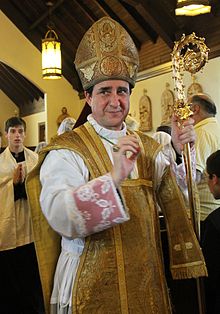Alfonso de Galarreta | |
|---|---|
| Auxiliary Bishop of the Society of Saint Pius X | |
 Bishop Alfonso de Galarreta, circa 2011. | |
| Orders | |
| Ordination | 24 August 1980 by Marcel Lefebvre |
| Consecration | 30 June 1988 by Marcel Lefebvre |
| Personal details | |
| Born | 14 January 1957 |
| Nationality | Spanish |
| Denomination | Catholic Church |
| Alma mater | The International Seminary of Saint Pius X |
| Motto | Omnia per Mariam (All by Mary) |
| Coat of arms |  |
Ordination history of Alfonso de Galarreta | |||||||||||||||||||||
|---|---|---|---|---|---|---|---|---|---|---|---|---|---|---|---|---|---|---|---|---|---|
| |||||||||||||||||||||
| |||||||||||||||||||||
Alfonso de Galarreta Genua, FSSPX (born 14 January 1957), is a Spanish-born Argentine traditionalist Catholic bishop of the Society of Saint Pius X. Bishop de Galarreta has served as the First Assistant of the Society of Saint Pius X, working under the direction of the Superior General Fr. Davide Pagliarani, since 2018.[1] In addition to this, Bishop de Galaretta has been the President of the SSPX—Vatican Commission since 2009, which directs the Society's correspondence with the Holy See.[2]
Born in Cantabria in northern Spain, he migrated to Argentina as a child. Alfonso de Galarreta underwent priestly formation at the International Seminary of Saint Pius X at Écône, Switzerland, before being ordained a priest by Archbishop Marcel Lefebvre at Buenos Aires in 1980. The Society represented a traditional Catholic pushback against the liberalising implications of the Second Vatican Council. Alfonso de Galarreta was one of four SSPX priests (along with Frs. Bernard Fellay, Bernard Tissier de Mallerais and Richard Williamson) who were consecrated as Bishops during the Écône consecrations in 1988. The consecrations were carried out by two bishops of the Catholic Church, Archbishop Lefebvre and Bishop Antônio de Castro Mayer, as an "emergency measure" due to Modernism in the Catholic Church, but without the permission of Rome, and thus Pope John Paul II claimed in his Ecclesia Dei motu proprio that the men had incurred latae sententiae excommunication on account of disobedience.[3]
The SSPX denied the legal validity of the excommunication, saying that the consecrations were necessary due to a moral and theological crisis in the Catholic Church and thus continued to operate regardless.[4][5][6] After the consecrations, Bishop de Galarreta became the Rector of the Our Lady Co-Redemptrix Seminary at La Reja in Argentina, which serves Latin America. He became the Superior of the SSPX District of Spain and Portugal in 1994, before becoming the Second Assistant of the Society of Saint Pius X in 2002. During the pontificate of Pope Benedict XVI in 2009, the Holy See officially declared the remission of the SSPX's contested automatic excommunications.[7]
- ^ General Assistants
- ^ SSPX's members of theological commission named
- ^ Apostolic letter Ecclesia Dei Archived January 29, 2015, at the Wayback Machine
- ^ SSPX FAQ Question 11 (29 June 1987). SSPX.org. Accessed 2008-01-01 Archived 12 April 2011 at the Wayback Machine
- ^ The 1988 consecrations: a theological study (July & September 1999). Sì sì no no via SSPX.org. Accessed 2008-01-01 Archived 2011-08-07 at the Wayback Machine
- ^ The 1988 consecrations: a canonical study (November 1999). Sì sì no no via SSPX.org. Accessed 2008-01-01 Archived 2011-08-07 at the Wayback Machine
- ^ Remissione della scomunica latae sententiae ai vescovi della Fraternità sacerdotale San Pio X, 24.1.2009 Archived 2009-02-01 at the Wayback Machine